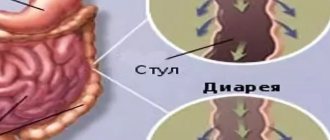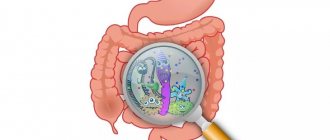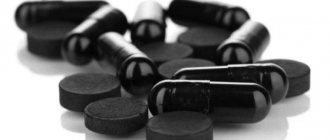Types of constipation and their causes
The causes of constipation are usually divided into two groups: organic and functional.
The first group includes birth defects, anomalies that are associated with surgery and the development of a tumor in the body. Functional constipation includes irritable bowel syndrome. This process can be facilitated by poor nutrition, a sedentary lifestyle, and prolonged dehydration. Reference! Fecal obstruction can begin after long-term use of medications. Prolonged stress and depression also have a bad effect on intestinal function.
Depending on the cause, constipation is divided into the following types:
- Ordinary. As a result of a functional disorder of the intestines, cracks occur in the anal area. With strong efforts during defecation, hemorrhoids appear.
- Neurogenic. Due to the prolonged tense state of a person, the process of formation of feces in his intestines is disrupted and congestion occurs. Movement through the intestines becomes problematic.
- Reflex. Occurs due to frequent suppression of the urge to defecate. There are many reasons for this violation: inability to visit the toilet on time, embarrassment to relieve oneself in a public place.
- Hypodynamic. As a result of prolonged adherence to bed rest, for example, during illness, stagnation occurs in the body. The process of defecation is disrupted and prolonged constipation occurs.
- Inflammatory. With various infections and inflammatory processes in the large and small intestines, its functioning is disrupted and a person cannot go to the toilet for a long period of time.
- Proctogenic. Occurs in people with pathology in the anorectal area.
The causes of constipation are:
- insufficient fluid intake;
- unbalanced diet, uncontrolled diets low in fiber;
- weakness of muscle mass during bed rest for fever;
- excessive use of laxatives with a sharp cessation of their use, which leads to addiction to the muscular urges of the intestines;
- side effects after some surgical interventions;
- long-term use of painkillers and psychotropic drugs.
Centrotherapy
Among the methods of reflexology, special mention should be made of centrotherapy. It is based on modern achievements of neurophysiology. The method has been open in France for over 100 years. Unlike acupuncture, centrotherapy can be performed from 5-6 years of age due to the painlessness of the procedures.
Centrotherapy has proven high effectiveness due to its unique mechanism of action. Light and painless electrothermal impulses applied to certain projection areas of the nose restore the functioning of the intestinal center* and the anxiety center*.
During treatment with centrotherapy, intestinal motility is normalized, stools become regular and soft in consistency, and the patient’s psycho-emotional state is normalized. Improvement occurs after the first sessions.
Centrotherapy allows you to simultaneously treat concomitant diseases: anal fissures, hemorrhoids, etc.
The course of treatment is about 10 sessions (2-3 times a week). The procedure is performed in the nasal cavity. No special preparation is required for the procedure.
* Terminology by P. Bonnier
https://youtu.be/-qKyLDJYzNo
Symptoms
If defecation occurs less than once a day, then this does not indicate the manifestation of constipation. Symptoms of constipation may include:
- delay in bowel movement for two or more days;
- hard feces in the form of dense lumps or dry individual fragments;
Attention! The consistency of normal feces is represented by the following approximate ratio: ¼ part water and ¾ part solids.
- rather scanty bowel movements;
- after defecation there is a feeling of incompleteness of the process;
- Evacuation occurs with strong efforts.
With chronic constipation, general health begins to deteriorate, heaviness is observed in the lower abdomen and pain in the intestinal area is increasingly disturbing. There is a sensation of blockage in the rectum after defecation.
Subjective signs of constipation often include:
- loss of appetite and sudden weight loss;
- nausea, up to gag reflexes;
- heartburn;
- flatulence;
- bad breath;
- headache and dizziness;
- light coating on the tongue;
- insomnia.
If a person has two or more of the listed signs, then doctors diagnose constipation of a permanent nature. The presence of just one described symptom indicates a random and temporary phenomenon associated with certain living conditions.
https://youtu.be/6_Up9usLFNg
What are the dangers of constipation?
Constipation affects people's quality of life. Unpleasant sensations in the digestive organs make it difficult to concentrate and perform work tasks. In addition, the danger of obstructing the act of defecation is as follows:
- The risk of intoxication of the body increases. Toxins that are not eliminated in time stagnate in the intestinal tissues and disrupt the functioning of other digestive organs. As a result, dysbiosis may develop.
- There is a risk of developing hemorrhoids.
- The intestines stop functioning normally and become inflamed. Its walls stretch, and there is a risk of developing a disease such as diverticulosis.
- When defecating, bloody clots protrude from the anus, which can lead to blood poisoning.
- Liver function deteriorates, and this leads to disruption of metabolic processes in the body. There is a risk of developing hepatic encephalopathy.
- Polyps and other neoplasms appear in the rectum.
- The risk of developing cancer increases. The accumulation of carcinogens in the rectal area can cause tumor phenomena.
Important! During pregnancy, constipation is very dangerous for the mother and fetus. These processes are especially harmful for women with weak uterine tone. Constant pushing creates a risk of miscarriage.
For children, stagnation in the intestines is more dangerous psychologically. Children have a fear of going to the toilet. Intoxication with feces causes poor appetite in a child, he experiences delays in physical and mental development, and dysbacteriosis appears. Regular constipation in children increases the risk of developing allergic diseases.
Survey
To clarify the diagnosis, an examination is carried out:
- general clinical examination is carried out by a therapist, gastroenterologist, coloproctologist, and, if necessary, other specialists;
- digital rectal examination (proctologist);
- stool examination, stool tests;
- sigmoidoscopy (allows you to visualize hemorrhoids, fissures and other changes);
- colonoscopy;
- ultrasound examination of the abdominal organs;
- identification of concomitant diseases.
Consequences of not treating constipation
With prolonged constipation, a person, in addition to poor health, fatigue and drowsiness, has a full range of complications:
- The condition of the skin worsens. Prolonged constipation leaves an imprint on the skin tone. It becomes grayish in color, dries quickly and takes on a wrinkled appearance. The body becomes covered with pimples and pustules (this is especially true for the face).
- Hair and nails suffer. Due to a prolonged lack of nutrients, hair loses its natural shine, becomes dull, splits, and falls out intensively. Nails begin to peel and break off.
- Decreased immunity. Due to the rapid spread of toxins throughout the body, its protective functions are reduced, and it becomes less able to neutralize harmful microorganisms. A person often begins to suffer from respiratory and viral diseases.
- Phlebeurysm. Stagnant processes in the pelvic area lead to impaired blood circulation in the organs of the genitourinary system and in the lower extremities.
Reference! Varicose veins on the legs often appear in women of reproductive age.
- The prostate gland in men suffers.
- Diseases of the liver and pancreas become more frequent, and a person develops colic.
The negative consequences of constipation may not appear immediately, but after several years. The body's susceptibility depends on the individual characteristics of the patient and the strength of his immune system. Timely treatment helps to avoid the problem of constipation and its complications.
Creating the right menu
On the Internet, on the pages of books, dozens of healthy eating techniques are offered. If your goal is to get rid of problems with bowel movements, then you need to know which foods are more likely to cause constipation than others.
The regularity of stool largely depends on the content of dietary fiber in food.
Fiber is the indigestible component of plants. Our body produces virtually no enzymes to process them. However, such structures are not useless ballast, but are extremely necessary for digestive processes.
Fiber, coarse fibers are synonyms. Some products are champions in fiber, while others contain less. When the diet includes mainly refined foods, constipation is inevitable. It is enough to balance the content of coarse fiber food, and the stool will improve.
The main suppliers of fiber are vegetables, fruits, and whole grains. All these products should be present in the daily menu. Interestingly, heat treatment has little effect on the ability to prevent constipation. Moreover, cooking and stewing help reduce flatulence. Some people prefer salads made from fresh vegetables, others like stewed vegetable stews.
Nutritionists distinguish a special style of eating - sandwich eating. The term describes the habit of snacking on the run, consuming ready-made factory products and semi-finished products. White bread with sausage or cheese for breakfast, ready-made noodle soup for lunch, dumplings in the evening - a couple of weeks of such a menu and constipation will become a faithful companion.
The list of foods that cause constipation includes:
- bread, rolls made from premium flour;
- sweets, white flour baked goods, ice cream;
- refined cereals such as semolina, rice;
- animal fats and proteins;
- cheese and milk, cottage cheese to a certain extent.
Why does white rice cause constipation, for example? The grain is completely cleared of its shell, and a perfectly refined product, completely devoid of fiber, ends up on the table. If you indulge in milk rice porridge, it will be difficult for feces to leave the intestines. So should you give up rice completely? Of course not.
It's the same with bakeries. If you notice a tendency towards constipation, it is enough to replace your usual white loaf with a whole grain one. You will have to limit the number of cakes; instead, it is healthier to eat jam or baked sweet fruits.
When answering the question whether milk can cause constipation, you need to consider the amount consumed. A liter or one and a half daily will strengthen the stool, but a glass of milk will bring undoubted benefits. You can get the necessary calcium from fermented milk drinks. Cottage cheese also sets the stool in place, but adding berries or fruit to it will instantly balance out the finished dish.
Prevention
In order to avoid constipation and complications, you need to adhere to the following steps:
- Normalize a healthy diet. Eat food in fractional portions. Food should be rich in plant fiber, prunes, cereals and vegetable oil.
- Drink as much fluid as possible. Metabolic processes are supported by clean drinking water, so it is simply necessary to drink it every time before meals.
- To live an active lifestyle. To normalize metabolic processes in the body, you need to constantly engage in physical activity (morning exercises, swimming, gym, running or walking).
- It will be useful to periodically take pine baths, which have a relaxing effect.
- If you have increased nervousness, you should take valerian.
- Do not abuse tobacco products and reduce alcohol consumption.
- Drink relaxing teas based on natural herbs that have a laxative effect.
- At the first sign of constipation, it is good to massage the abdomen to reduce muscle tension.











